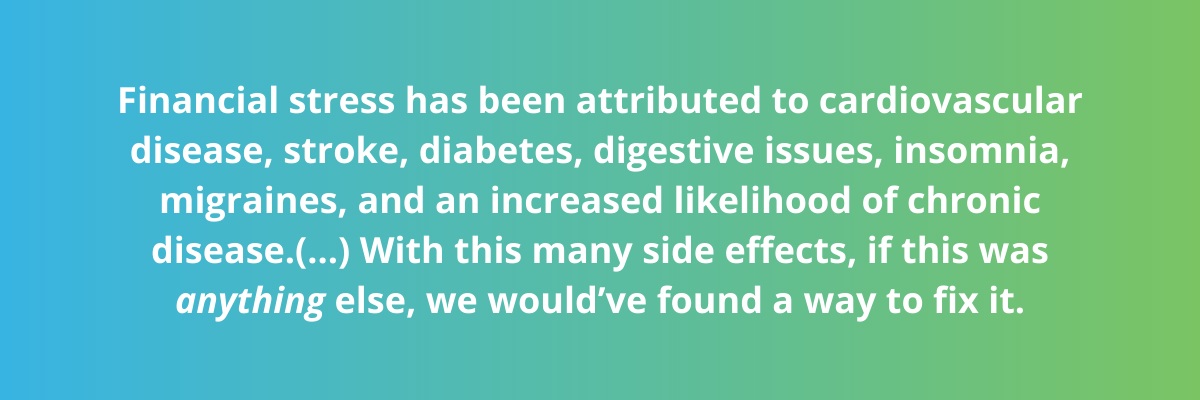
It's not 'just' stress: how your finances affect your health
/Social-ZZ-Infog-2.png?width=5001&name=Social-ZZ-Infog-2.png)
Nothing is certain in life, but if we had to name something, it'd probably be financial stress. We all know it, unexpected expenses come up and they don’t add up with payday, we’re supposed to save up for six months’ worth of wages, but barely seem to manage to make it until the end of the month.
Financial stress has been attributed to cardiovascular disease, stroke, diabetes, digestive issues, insomnia, migraines, and an increased likelihood of chronic disease. Prolonged depression and anxiety are also prevalent amongst people worried about their finances; leading people to make poor choices, that can range from poor nutrition to substance abuse. With this many side effects, if this was anything else, we would’ve found a way to fix it. Yet we count it as a part of life and move on.
In the United States, 68% of employees feel personal financial issues affect their health while 43% of Canadians are in the same position. To compound the problem, people are not going to the doctor because it costs money. A study by the American Psychological Association finds that 12% of Americans avoid going to a doctor because of financial reasons; whilst 1 in 5 consider evading medical attention of any kind entirely.
While stress is a natural occurrence and everyone experiences it, there is a difference between good and bad stress. Experts confirm that a little bit of tension is good and can help people build resilience, yet there is a difference: the short-term tension of meeting a deadline can make the biggest procrastinator stay focused and on-task; the un-ending stress of not being able to feed your family, on the other hand, will overwhelm anyone and can bring about dire consequences.

So, what does this stress look like?
It will vary from person to person. It may be waking up in the middle of the night not being able to go back to sleep as scenarios play through your head of what can happen if you don’t pay your student loans on time. You may feel irritable and act combative with your significant other or friends. It may be heartburn.
Losing interest in things that you felt excited and passionate about or avoiding social gatherings are an indication that the pressure you feel is bleeding into the things that once made you happy. It will not be overnight, but it is important to recognize when things are getting out of hand. Using the distress from financial worries to problem-solve and having a plan is just the first step to having your health back.
Having access to attainable economic solutions provides folks with the ability to make positive changes towards gaining personal and professional freedom. Financial options give you real-world options. They can reduce and potentially eliminate stress and start living a better life. ZayZoon's Wages On-Demand is one of those solutions. 89% of employees report that ZayZoon reduces their financial stress noticeably.
So, what are you going to do to reduce your financial stress?
To learn more on how ZayZoon is helping people achieve financial wellness, check out ZayZoon.com/education.
--
This is part of our 10 Facts on Wages On-Demand series, to see all the existing pieces, click here.




